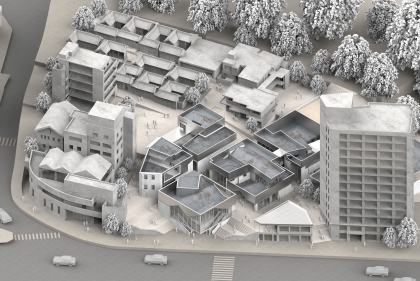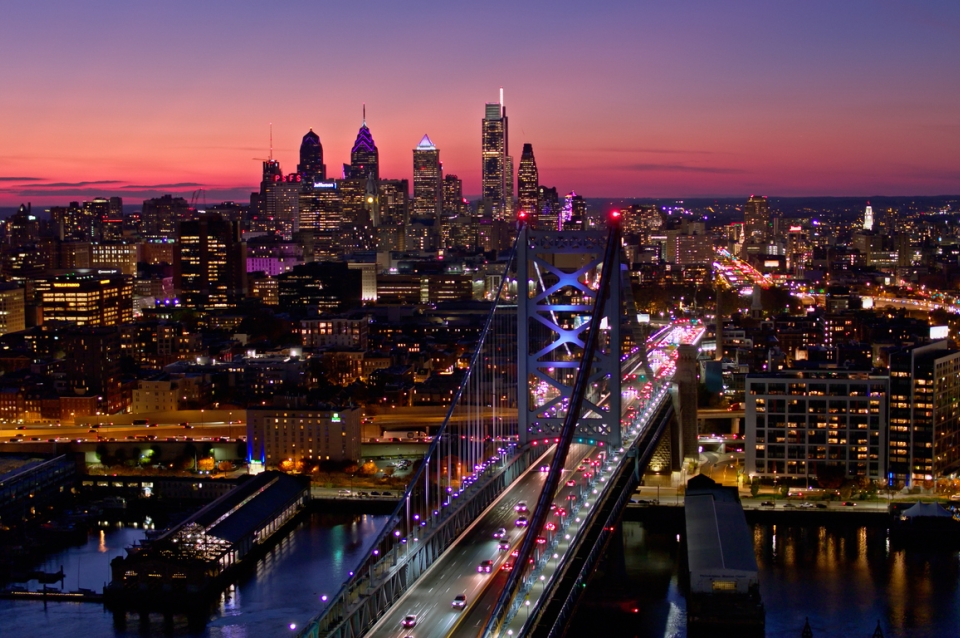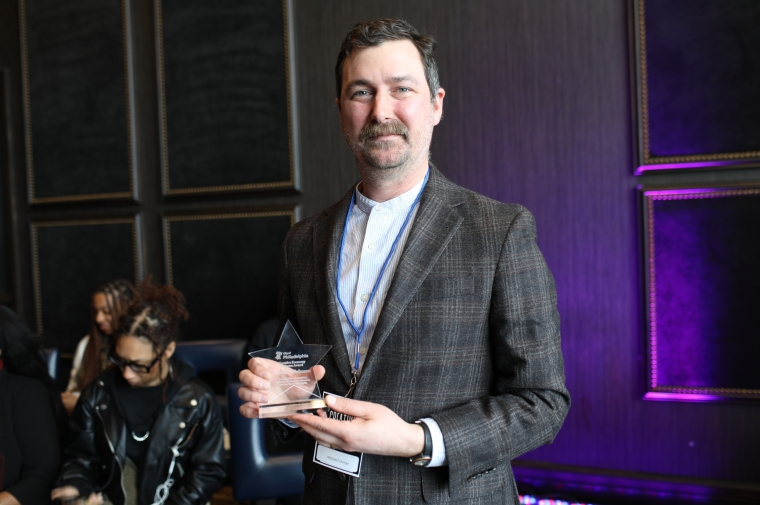August 19, 2022
Stuart Weitzman School of Design
102 Meyerson Hall
210 South 34th Street
Philadelphia, PA 19104
Get the latest Weitzman news in your Inbox
In July, the City of Philadelphia joined a handful of US cities in appointing a “night mayor” with the selection of Raheem Manning to serve as director of the nighttime economy and business development. The appointment grew out of a sustained effort by Michael Fichman, a research associate at PennPraxis who teaches in the Master of Urban Spatial Analytics Program, to champion nighttime cities internationally. Trained as a city planner, Fichman has been active in the music industry as a DJ, producer, composer, and label executive for two decades.
How did Philadelphia come to have a night mayor?
This is an example of preparation meeting opportunity. In the 2010s, there were a series of Council bills that would have negatively impacted the live music scene. The community organized and we fought back successfully. In 2017, I founded 24HrPHL, a group that supported dialogue and resource sharing for nighttime workers. We had European night mayors to Philadelphia for talks, and our surveys showed our community was interested in the idea.
In 2020, Councilmember Isaiah Thomas named me to City Council’s Arts and Culture Task Force, where I chaired the nightlife committee. We recommended programs, funding, and legislation to help arts industries floored by the pandemic. We focused on nightlife because it is the time and place when so much artistic production and commerce happens and those businesses were closed. We made a wide range of recommendations and said that there needs to be a governance framework to make the policies work—that’s the “night mayor.” The Night Time Economy Director’s Office was adopted in last year’s budget and it is closely modeled on the proposal we wrote for Council and the Commerce Department. Raheem Manning was hired to the position last month.
“Night mayor” is a popular way of referring to roles like this, but we should clarify that the Philly role doesn’t mirror the mayor’s responsibilities.
That’s certainly true. This is not a person who is the city executive after the mayor goes to bed, it’s somebody who is charged with coordinating services, planning, regulation and engagement related to nighttime businesses and communities. The name is very cool though! It comes from a fellow called Jules Deelder, who was a poet and cultural figure in Rotterdam in the late 20th century. He was dubbed the “night mayor,” and that was the name that stuck with the first real nighttime economy municipal official, my research collaborator Mirik Milan, the first Night Mayor of Amsterdam. In the dozens of cities with this role, people use various terms for this: “night czar” or “nighttime manager” or sometimes this belongs to a “Music and Entertainment Office.” The jobs vary in their responsibilities and powers, but people colloquially say “night mayor.”
How could the city and its residents benefit most?
Stakeholder engagement, first and foremost. There are so many fraught relationships around nighttime industries—between businesses and the City, around services and regulation, and between communities and establishments around development and nuisance—and these can be smoothed with good engagement and negotiation.
There’s also the benefit of somebody who can help grow our cultural industries and improve our city after dark in a very deliberate way. We now have a central person working on this in government who can apply thoughtful approaches to issues like public safety. Incidents of violence like Philly has seen this year call for night-sensitive governance rather than bans on nightlife. This position changes that and sets us up to plan for a Philadelphia that can keep its talented artists from moving and improve quality of life.
What other US and overseas cities have a position like this and what can Philly learn from them?
There are at least 40 cities worldwide with this kind of office by the last formal count, and there are more forming all the time. The biggest lesson to learn is that there is a great network and community around these issues. Nighttime professionals and advocates around the world trade stories and information all the time. You don’t need to reinvent the wheel. Through the process of creating the office, we have been in constant communication with New York, Austin, San Francisco, Seattle, Austin, and Berlin, among other places, to figure out the right structure and programming for Philly.
You were a creator, editor and author of the Global Nighttime Recovery Plan—an effort to help cities recover economically from COVID-19 based on nighttime arts and culture. How is the sector doing these days, and what changes besides more night mayors can help?
Recovery of nighttime industries has been slow. We don’t quite understand yet how people’s preferences for consuming entertainment and living and working in cities have changed. In Philly, we have seen limited economic recovery and ongoing concern about violence. It’s the subject of a recent Op-Ed I wrote. There are some studies emerging from the UK showing a 20% attrition in venues—a continuation of a pre-pandemic problem. In positive news, I think the pandemic focused needed attention on creative industries and working conditions, and prompted experiments like on-street commercial activity. My colleagues at VibeLab finally got nighttime on the agenda at the UN World Urban Forum this year.
I think the opportunity here is that, as cities are being re-shaped, we can think about how to use more spaces for arts and creativity. Take Philly: Real estate market dynamics banished many independent venues from Center City over the last 20 years, but now the commercial landscape is in flux. I’ve seen in my consulting research that high land values are related to decreased investments in programming and diminishment of creative spaces in urban areas. If we use incentives, zoning, regulations and other creative ideas, we can bring live arts to Center City and to areas across the city in a durable way.
What led you to become active in supporting nighttime economies?
I have been in in the music business since I was a teenager. DJing, record producing, and events promotion were my full-time job for many years, so I saw the issues—transportation and wages and safety—from the inside. It’s where I come from and where I’m most comfortable. Through touring, I saw all the different ways cities can support or ignore nighttime activities and wondered why things were so varied. After I got a degree in city planning, I realized there were ways I could be a useful advocate and resource for my community, so starting 24HrPHL was the first step. Since then, I’ve been very active in working on studies, consulting, and advocacy worldwide.
What do people generally misunderstand about 24-hour cities?
That every city is a 24-hour city. Or that “nighttime” thinking is just about nightlife and entertainment. Wherever you go, there are people working, sleeping, moving, eating and whatever else—all day and all night. Being deliberate about how you apply good urban policies to keep cities safe and harmonious: That’s not just what enables art and culture to thrive after dark, it’s what gets nurses to work, gets the trash collected and a lot more.


 Expand Image
Expand Image


